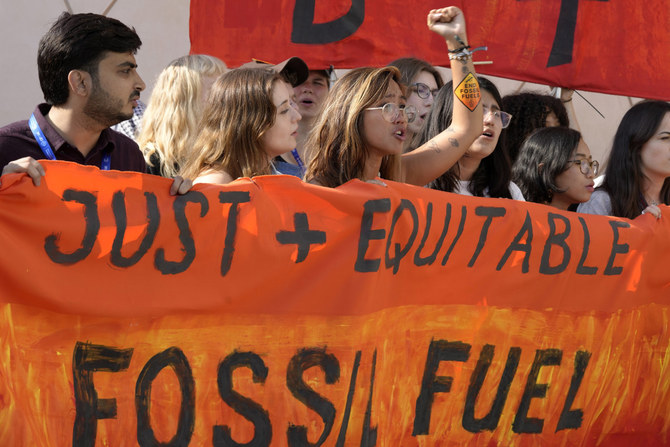PARIS: After COP28’s landmark call for the world to move away from fossil fuels, experts say the pressure is on to fast-track — and fund — the global energy transition.
The agreement was a compromise wrestled out of countries with sharply conflicting interests by the oil-rich United Arab Emirates, hosting COP28 in the last days of the hottest year humans have recorded so far.
It calls for “transitioning away from fossil fuels in energy systems, in a just, orderly and equitable manner” — after three decades without naming the main driver of planet-heating pollution.
With rapidly-accelerating climate impacts slamming communities across the planet, observers said this was both a major milestone and the very minimum needed to steer the world onto a safer track.
The bigger challenge will be turning the promise of the COP28 agreement into sweeping global decarbonization that comes close to the goal of limiting warming to 1.5 degrees Celsius from preindustrial levels.
COP28’s goal to triple global renewables capacity and double the rate of energy efficiency improvements by 2030 will require significant investment, particularly in developing countries least responsible for warming.
An editorial in Indonesia’s Jakarta Post on Thursday called on rich polluters to scale up finance.
“COP28, where is the dough?” it asked.
The Dubai text acknowledged that trillions of dollars are needed by debt-stricken developing countries to meet their climate targets this decade as they face worsening warming impacts.
But Senegal’s climate envoy Madeleine Diouf Sarr, Chair of the Least Developed Countries Group, said it “fails to deliver a credible response to this challenge,” calling for 2024 UN climate talks to work to close the gap.
Countries in Dubai were tasked with responding to a damning assessment of progress on the world’s existing flagship climate promise — the 2015 Paris deal’s commitment to limit warming to “well below” 2C and preferably to the safer 1.5C threshold.
At 1.2 degrees of warming, scientists have said climate change was a major driver of the extreme heat that has scorched across the planet this year and stoked massive fires in parts of Canada.
It increased the severity of devastating drought in the Horn of Africa — and then exacerbated catastrophic flooding in the same region.
“Until fossil fuels are phased out, the world will continue to become a more dangerous, more expensive and more uncertain place to live,” said Friederike Otto, senior Climate Science lecturer at the Grantham Institute, Imperial College London.
Before COP28, Earth was heading toward disastrous heating of between 2.5C and 2.9C by 2100, according to the UN Environment Programme (UNEP).
The Dubai decision had not changed the reality that the world is not on track, said its Executive Director Inger Andersen.
“Now the hard work of decarbonization must begin,” Andersen said, calling for greater financial support for poorer countries in their energy transitions.
Observers said a lack of specifics on finance in the COP28 text sets the stage for the issue to dominate COP29 talks next year in Azerbaijan and ups the pressure for sweeping climate-focused reforms of the World Bank and International Monetary Fund.
Nicholas Stern, of the Grantham Research Institute at the London School of Economics, said countries should respond to the COP28 decision with “a huge increase in investment” in clean energy and green growth.
That is particularly needed in developing countries, except China, which face an estimated $2.4 trillion annual cost by 2030 to meet their climate and development priorities.
The International Energy Agency estimates global clean energy investments need to reach $4.5 trillion a year by 2030.
That is a steep increase from the $1.8 trillion this year, helped by policies in the United States, Europe, China and India.
IEA chief Fatih Birol called on countries to follow through on COP28 with more “concrete policies,” in a post on X, formerly Twitter.
Nevertheless, “spectacular” growth of technologies like wind and solar, as well as electric vehicles, has enabled the IAE to forecast that world fossil fuel demand will peak this decade.
That prognosis has been shrugged off by fossil fuel producers.
They plan to continue to expand oil, gas and coal despite the message from climate scientists that this would push the world beyond the 1.5C target.
Observers say loopholes in the Dubai text include the focus on fossil fuels for energy — potentially leaving out polluting products like plastics and fertilizers — as well as a nod to gas as a “transition fuel.”
Bill McKibben, the founder of environmental campaign group 350.org, said while the COP28 call to shift from fossil fuels may seem like “the single most obvious thing one could possibly say about climate change,” it could give activists a powerful new argument.
“We need to insist that the clear, plain meaning of the language is, the fossil fuel era is over,” he wrote in his newsletter.
klm/rl



















